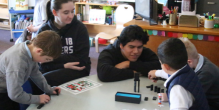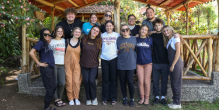Midwestern Values Far From Home
Reprinted from Traditions, Summer 2021
July 28, 2021
“It was not on par with the Iranian hostage crisis (1979-81) by any stretch of the imagination, but you don’t know that at the moment,” said Scott DeLisi ’71, remembering the attack on the U.S. consulate in India in March of 1982.
“You know that there’s a mob storming the doors, you know that they’re smashing the windows, you know that they’re setting cars on fire out front and you hear gunshots, and you realize, ‘this isn’t good.’ ”
DeLisi describes crawling along underneath the windows over the broken glass to get to the back of the room to lock the space. “We needed to secure the area, we had to get people out safely, and we didn’t know what was going to happen.”
He was 29, and had only been serving as a Vice Consul in India for a couple of months. If he hadn’t known already, the attack confirmed that a career in the foreign service would not be a dull one.
Over a decade earlier, and thousands of miles from such international conflict, DeLisi was a student at Cretin. He doesn’t recall being particularly tuned in to world events, even though he attended at the height of the Vietnam War.
A Personal Search for Purpose
“I grew up in a bit of a bubble,” he said. “The Vietnam War was very much front of mind for so many people, but I was just trying to get through high school. I may not have been the most socially aware, I don’t think many of us were. But between the war and the JROTC program, there was a growing awareness, and that growing question that you had to ask yourself, ‘Would I be willing to serve? What is my relationship with my nation? What is my responsibility?’ ”
After graduation, DeLisi enrolled in the University of Minnesota and found himself in the middle of a campus embroiled in all the political arguments of the day.
Although he was a strong student and doing well academically, he found himself at a crossroads. “It was a challenging time, and it made me ask myself, ‘What am I doing? Why am I here?’ I didn’t know the answer to that,” he said. So he quit.
He went to work for his dad’s produce company, got married, and went backpacking in Europe with his new wife, Betsy. His view of the world was transformed by the variety of cultures, languages, and perspectives he encountered. They returned to St. Paul, and DeLisi re-enrolled in college.
“I still wasn’t sure what I wanted to do, but I knew that there was this bigger world out there and somehow I’d like to be more of a part of it,” he said.
He tried a few different pathways, eventually chose law school, and then joined the Foreign Service in 1981.
His first posting was at the consulate in India where he experienced the attack. Over the next four decades, he served in Madagascar, Pakistan, Sri Lanka, Nepal, Botswana, Eritrea, and Uganda. Betsy, sadly, passed from cancer early in their journey. He remarried and he and his wife, Leija, and their three children moved every few years, immersing themselves in new cultures and representing the United States.
In 2004, he was named Ambassador to Eritrea, and later served as Ambassador to Nepal and then to Uganda. It was an overwhelming responsibility to serve as the personal representative of the President of the United States. Nearly two decades later, his awe at the opportunity is still apparent.
“You don’t appreciate it until it actually happens, until you’re given that responsibility to represent our nation, just how daunting it can be,” said DeLisi. “It was such a tremendous honor. I hope that I made a difference for our nation. I hope that I represented the values that we stood for, and that we really did have an impact.”
Hometown Values Led to Global Impact
DeLisi was part of a myriad of projects that saved lives all around the world. He fought for human rights and was part of the war on terror. He led the campaign against HIV/AIDS in Uganda, directed programs to save the lives of mothers in childbirth and worked to protect young children from malnutrition. After retiring in 2015, he became the Executive Director of the Engage Nepal foundation, which focuses on preparing for earthquakes and other disasters before they happen. He has spent a lifetime building relationships and finding ways to be of service across the globe.
“I talk about them as Midwestern values, but they were also a part of what we learned at Cretin about being engaged, about giving back, about being part of your community by making a difference,” reflected DeLisi.
He credits those values for leading him through a life that has been so incredibly rich and a life that has been about service.
“My service was not just to our nation, but to fellow humans. It was service in the name of the values that we believe in. It was service to a global community, looking at issues that affect us all, and recognizing that we need to engage, that we need to try. We need to try to make a difference. Whether we’re successful or not isn’t what matters, but you aren’t going to change anything if you
don’t at least try.”
Subscribe to our e-Newsletters
You might also like:
Empty Bowls Marks 24 Years of Fighting Hunger and Building Community
Cretin-Derham Hall’s 24th annual Empty Bowls event brought together students, local businesses, and community members to raise over $6,000 for Heifer International in support of ending hunger and promoting sustainable living.
CDH Brings Annual Christmas Party Tradition to Community of Saints Children
This year’s festivities included building gingerbread houses, playing games, reading stories, singing songs, visiting Santa, and sharing gifts with the children.
CDH Students Embrace Service and Learning on Trip to San Lucas, Guatemala
On November 24, twelve Cretin-Derham Hall students, along with chaperones Brock Beithon and Ruth Johnson, embarked on a week-long justice education trip to San Lucas, Guatemala.




